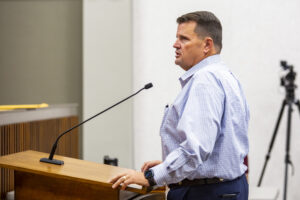A Medical Center Hospital board member and an Odessa city councilman say Ector County’s top elected official could keep the county from getting tens of millions of dollars more in federal rescue funds aimed at helping cities and counties struggling amid the COVID-19 pandemic.
Ector County received $32 million in federal funding that could be granted to local hospitals and then reimbursed to the county through a FEMA program that would essentially double the federal dollars.
And that’s not all.
MCH board member Don Hallmark and Councilman Steve Thompson allege Ector County Judge Debi Hays is behind a misinformation campaign aimed at discrediting the public hospital.
Thompson, who previously served on the MCH board, referred to Hays and her supporters as “clueless” and said the judge “doesn’t know the history” between the county and MCH.”
The public spat began earlier this week after Hays questioned whether MCH and Odessa Regional Medical Center really needed American Rescue Plan Act funds to help the hospitals meet escalating costs due to COVID-19.
Since then, a barrage of allegations accusing MCH of misusing sales tax dollars has circulated on a Facebook page that Thompson claims is run by Hays and/or her supporters.
Hays says she is not behind the social media effort.

“I didn’t have anything to do (with what’s being said about MCH),” Hays said. “I am not affiliated with anyone saying these things.
“(The hospitals) shouldn’t be discredited for anything they’ve done. They have been heroes in the community.”
Hallmark, who said he campaigned for Hays four years ago, isn’t buying it.
“Sure she didn’t have anything to do with it. I don’t believe it. There is no question where it came from. I have heard those words before,” Hallmark said. “It is ridiculous. This is not how we are supposed to be doing business in Ector County.”
He said both Hays and County Commissioner Don Stringer have both said that the hospital needs to “give the money back that we (the county) gave ya’ll to set up the hospital district.”
“The hospital district was set up by the county. They gave it away to get out from under it and now they act like we came in and robbed them in the middle of the night…they are literally saying we stole their money and that is not what happened.”
Hallmark is correct that it was the County that helped take the issue to voters to form the hospital district. But this issue seems to surface every couple of years – especially years when the County is cash-strapped or, in this case, now in charge of a pile of federal dollars.
In 2016 commissioners held a special meeting where it was clear that the commissioners were under the impression that the county gave their portion of sales tax money to MCH in 1990 after the hospital was broken away from Ector County oversight and became its own hospital district with elected board members and the right to property taxes in Ector County.
However, that’s not exactly accurate. Ector County had never received sales tax money, and therefore could not have later given it to MCH. In March of 1990 commissioners unanimously agreed to support the Ector County Hospital Board in its bid for a 1 cent sales tax.
By approving a resolution in 1990 to not seek the sales tax, they essentially supported MCH’s bid to get the sales tax rebate money. In May of 1990 voters approved giving that sales tax to MCH’s hospital district and by Jan. 1, 1991, MCH would get its first sales tax rebate money, which was a $442,270.80 check in March 1991.
That sales tax money, along with property tax money, essentially saved the cash-strapped hospital. Since then, the hospital has grown into a thriving medical community. But the last two years have hit MCH, and all hospitals, hard as COVID surged.
A 2016 OA article quotes Tom Pace, who was the fiscal services director for the county at the time of the sales tax discussions, and he said the commissioners in 1990 felt the money was needed to support the hospital.
“The county, after doing some research on it, decided we would not be well-served with the one penny (per dollar),” Pace said.
Thompson, who served on the Ector County Hospital District Board from 1991 to 1997, said voters approved a hospital sales tax.
At the time, MCH, which is a non-profit county district hospital, was on the verge of closing due to financial struggles. Unlike private, or for-profit hospitals, MCH is required to accept all patients regardless of whether they have insurance or have the means to pay their hospital bills.

MCH loses about $70 million per year due to unpaid medical bills, MCH President and CEO Russell Tippin said.
“The intent of the sales tax was to cover indigent care,” Thompson said.
The recent social media posts angered both Tippin and Thompson.
The Odessa Accountability Project’s Facebook page had been public but was made private this week after claiming that MCH had taken sales tax revenue that could have instead been used by the county to provide “running water” for residents.
MCH critics also claim that the hospital wants to raise the sales tax.
“Those claims are inaccurate,” Tippin said. “I wish Russell Tippin had that power. I don’t. Voters approved the sales tax. We haven’t stolen anything.”
In 1997, MCH agreed to put on the ballot a reduction of its sales tax to fund the City’s economic development corporation.
The 2016 county attempt to get the hospital to hand over the remaining sales tax dollars eventually fizzled out.
Now the fight is over the rescue dollars. Hallmark said Hays clearly has an agenda for the rescue funds and that agenda does not include helping the hospitals. He said both MCH and ORMC have led the COVID fight in Odessa – not the county or the county run health department.
Hallmark said much praise has been awarded to MCH CEO Russell Tippin for his part in the fight against COVID and that he believes that doesn’t sit well with Hays. “All that praise was well-deserved for what he is doing. We taught the nation how to do a mass vaccine clinic and she is mad that the attention was taken away when she flopped and hid. That is not Russell’s fault and now it is a revenge factor going on and it is nonsense. …I’ve never seen anything like it.”
Hallmark detailed that when COVID hit Odessa, Hays had a very public spat with the media and didn’t want to answer questions and basically “went into hiding.”
Hallmark, who was MCH board president at the time, said Tippin came to him and said someone has to “run the show because she (Hays) won’t answer the phone.”
“I told him to run the show and do what you need to do to make it happen,” Hallmark said.
He said Tippin has reached out repeatedly to Hays with little response since the start of COVID. He said Tippin appeared before the county commissioners during the summer to make the case for why the hospitals need the rescue funds now and how the county could be reimbursed.
On Tuesday, Hays and county commissioners voted unanimously to seek bids from consulting firms vying to serve as an administrator of the county’s ARPA funds. Their vote comes months after commissioners ignored pleas from MCH and ORMC for financial assistance as local COVID numbers rose to record levels.
Hallmark scoffed at the idea that commissioners and Hays, who are all paid salaries unlike hospital and city council members, would pay tax dollars to an outside firm to decide who will get the rescue funds.
“There is no common sense and they are acting like children.”
Hallmark said it is a waste to pay someone to hand out the money when the commissioner’s court should do it. “I think it is only being done because they need arm’s length away from the decisions that they are going to tell these people to give them in the first place.”
Hays said both hospitals have already received millions of dollars in federal funding, and the city council recently allocated $3 million in ARPA funds to MCH and another $1 million to ORMC. The city council said they approved the funding request by the hospitals, because the city can be reimbursed those dollars by FEMA if the hospitals receive the money by the end of the year.
“The hospitals are welcome to come and request money from the entity we hire,” Hays said of the county’s ARPA funds.
On Thursday, Hays said she realizes that the county will likely miss that deadline to be reimbursed through FEMA because the commissioners court may not award the money by Dec. 31, which is the deadline for entities receiving funds to apply for reimbursement.
Hallmark on Friday said Hays is not thinking about reality. He said not turning the $32 million into $64 million doesn’t make any sense. The FEMA program with the Dec. 31 deadline will reimburse for certain expenses dollar for dollar. Tippin has also said that the hospital could provide enough receipts for the full $32 million if needed.
“The way the program is set up is for them to distribute the money and then get back what they distributed…so far all she has done is make up gaps in their own deficit…it makes no sense…they can give the money to even the volunteer fire department and to Medical Center Hospital and still get all of it back. I don’t know what her agenda is but it is an agenda to hurt the hospital.”
Prior to the county vote Tuesday, Hays said the hired company would be responsible for vetting applications and recommending applicants for commissioners to choose from. The selected company would also conduct financial audits to make sure the money is used correctly.
Hays acknowledged being aware of the Accountability Project, but said she doesn’t support their claims.
“You can’t believe everything you read on Facebook,” Hays said. “I don’t want to be involved in anything that will divide this community.
“We can all accomplish more by working together. We should all have a common goal.”
Thompson said Hays comments sound sincere, but added the county hasn’t shown much interest in working with other entities during the COVID crisis.
County officials and MCH have long had political differences, Thompson continued. For example, when he served on the hospital district board, the county insisted that hospital employees and their salaries be included as part of the county’s figures. The reason, Thompson said, is the higher hospital salaries translate into higher salaries for county commissioners, whose salaries are based on an average of county employee wages.




